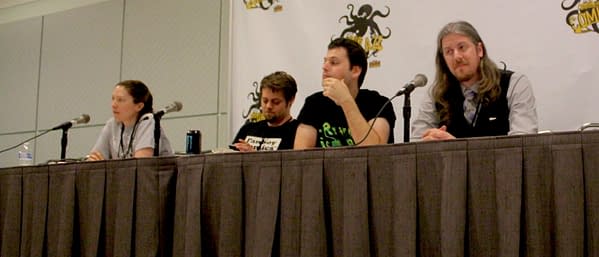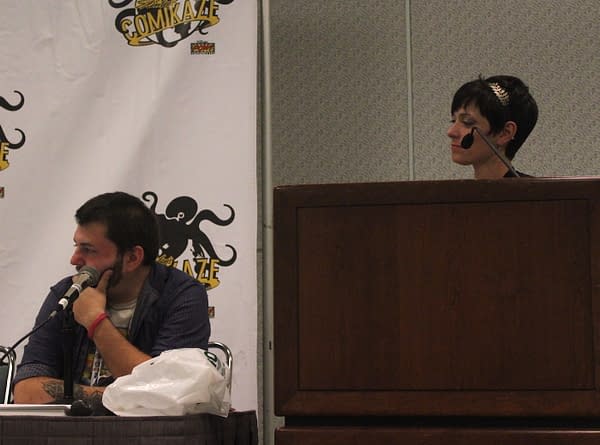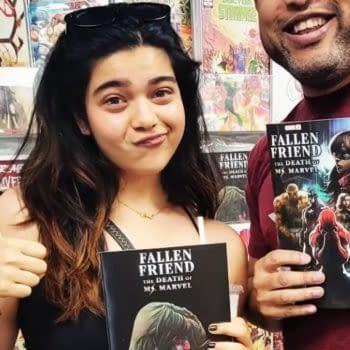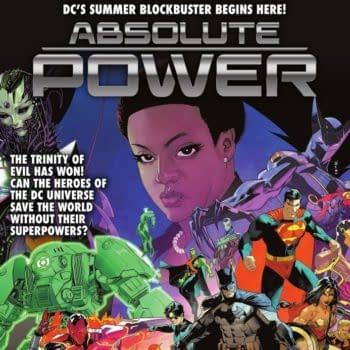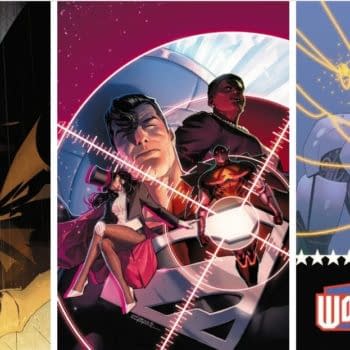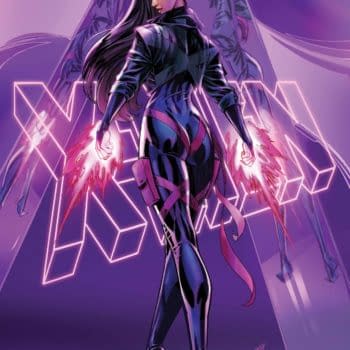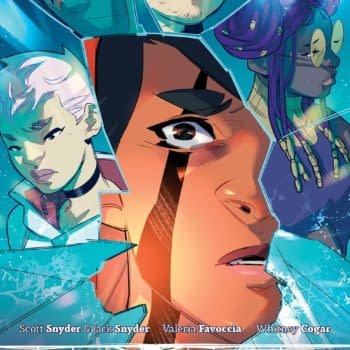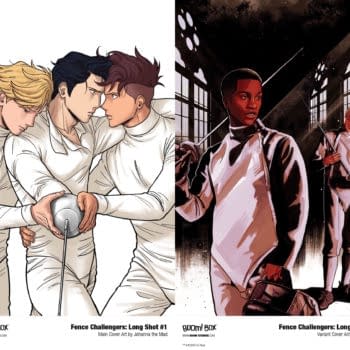Posted in: Comics | Tagged: Barbra Dillon, Bryant Dillon, Fanboy Comics, Kevin Bieber, Madeleine Holly-Rosing, siike donnelly, Stan Lee's Comikaze, William Orr
Comikaze 2015: Indie Creators Share Self-Publishing Experience
By Michele Brittany, SoCal Correspondent
Why is self publishing so important? On Saturday afternoon at Stan Lee's Comikaze, the panel Indie Creators, Unite! A Guide to Self-Publishing explored that question. Moderator Fanboy Comics' Managing Editor Barbra Dillon was joined by Siike Donnelly (Solestar, The King of Neverland); William Orr (Hunter Black); Kevin Bieber (Man vs. Rock); Bryant Dillon (Identity Thief, Something Animal); and Madeleine Holly-Rosing (Boston Metaphysical Society, Kickstart for the Independent Creator: A Practical and Informative Guide To Crowdfunding).
Why is self publishing so important? The panelists cited several reasons: "I can be innovative and creative," Donnelly said. "It's easier to do when you self-publish." Orr said that he could do his own thing and more importantly, he could own his project and do what he wanted with it. Bieber concurred citing he was able to work on projects that he could not do elsewhere. Owning one's IP was crucial: Bryant Dillon used the example of Joss Whedon, who made more money with Dr. Horrible's Sing-Along than with The Avengers. Holly-Rosing agreed and added that by owning her own IP she could expand it as she wanted.
Barbra Dillon summarized the structure of the panel would mirror the self-publishing process to bring an idea to realization. Once the writer or artist has an idea, it is time to assemble a creative team, especially if the writer is not also an artist or vice versa. According to Bieber, who writes but cannot draw, he went to Craigslist to find an artist. Artist Orr said he met his writer at his day job, however a person can find collaborators through the cons and Deviant Art. Bryant Dillon added to not forget that panels are also a networking opportunity. Bieber said it was how he got his start. Holly-Rosing stressed the importance of building relationships and attending classes to learn and hone one's craft.
During the selection of a collaborator, one of the main considerations is payment. "How much can you spend," Holly-Rosing asked, then added a follow up question: "Can your partner be paid on the back end?" Along with determining payment terms, Orr and Bieber stressed the need for a contract. Bieber warned that "every person on the project does have a claim" to the project venture. Bryant Dillon said that even if you are friends, its still important to have a contract in place.
The next step is deciding to self-publish or go with an established publisher and Barbra Dillon asked each panelist their decision process. Orr said going with an established publisher is an agonizing slow process with a lot of slow response times. Bryant Dillon revealed that even with an established publisher, a person will still be expected to complete quite a bit of leg work, particularly relating to social media and marketing propagation. Orr agreed, adding that marketing is very important to the process and it will make impact the success of the project.
What do you need to do if you are going to seek out a publisher? Orr said to research the publisher and determine what they want in the submission. Bryant Dillon concurred and reiterated reading the directions. Donnelly stated that when he was working with Top Cow, he read a lot of submissions. He said many of the submissions were instantly rejected because their formatting did not confirm to the guidelines. Donnelly reminded the audience to follow the rules.
That said, Holly-Rosing revealed that small press is easier to break into than the larger, established publishers in part because a person can meet publishers at the cons. Smaller publishers are also likely to provide feedback that the larger publishers will not. Note that the small publishers have submission guidelines too, so follow them. She suggested Action Lab Comics and Darby Pop when Bryan Dillon said Image is harder to get break into because so many indie creators go to them. Barbra Dillon interjected that Fanboy Comics is always interested in submissions and if they cannot accept the project, she said that she'll provide feedback as well as recommend other publishers that would fit the project.
Donnelly shared a story of when he was pursuing Marvel, he submitted to the publisher each Friday they were accepting submissions. He did that consistently every week and eventually, he started getting rejection notices every week. By the time he attended San Diego International Comic Con, he had a huge folder of notices. At the Marvel booth, he met the editor, who remembered Donnelly. The editor said Donnelly had promise but needed work. Donnelly said that is when he found out how important quality is over quantity.
Bryant Dillon brought up that if a person is shy and introverted, then they will have to overcome it – even if it is just saying hi to people as they pass by your table. Holly-Rosing suggested that to overcome shyness, a person should take an acting or speech class. She also said it is crucial to develop the elevator pitch, that one or two minute pitch which concisely describes and markets the project to a prospect.
Another decision to be weighed is print or digital format? There are pros and cons to each. Hunter Black was begun on the web because Orr and his writer did not think that anyone would by the print version. While there isn't a print cost associated with the web, there is a cost associated with building the website if choosing to hire a person rather than do it yourself. Orr said they paid $1,000 to get their site up and running.
Bryant Dillon stated that a person can start on even a smaller scale by using Facebook, Tumblr and Deviant Art and then grow into a website. Donnelly said he began with Myspace. He watched tutorials on YouTube, was open to suggestions and advice from others and was willing to learn how to code.
Holly-Rosing started with a web comic on a website she built. Knowing that if she wanted to make money, she would have to cross over into the print format. She also mentioned that she brought all of the derivative names to her main domain name of "Boston Metaphysical Society" and had all of the variations pointing to her main website. Bieber agreed and added that print is advantageous if the person is attending the cons. Comixology is worth doing, but he stated there are critical format guidelines.
Barbra Dillon asked the panelist their experience with Kickstarter campaigns since most of them had done one. Holly-Rosing was on her fourth campaign and was at 170% over her goal. She teaches a Kickstarter seminar in Los Angeles and has written a book on running a successful campaign. "I chose Kickstarter because of the community atmosphere," she said. She advised backing other projects, even if it is only a couple of dollars, because the effort shows a desire to become a part of the community. And often, people will find other campaigns that way.
Donnelly's campaign for a his new book The King of Neverland, based on the Peter Pan IP, is 400% over the goal he set out. He has already successfully campaigned two projects. On this project, he said he did zero marketing other than announcing it on Facebook, yet he felt fortunate because people sought him out.

The last point on the agenda and the most important: marketing, promotions, and cons. Holly-Rosing stressed knowing the project pitch because the pitch can be integrated on marketing materials – bookmarks, Twitter, Facebook, etc. – and provides a consistent message and conveys what the project is about.
Bryant Dillon focused on attitude: "Be nice," he said as "everyone is worth your attention." Bieber agreed and encouraged to be bold and be outgoing. "Be good to your fan base," Orr stated. He said they could promote projects via social media outlets and word of mouth. Barbra Dillon said she has worked both sides of marketing and advised providing concise information to prospects.
With only a few minutes left of the panel, a question from the audience asked the panelists how they deal with burn out? Bieber stated that you just have to do it the work. His day job is so different from his creative pursuits that he finds enjoyment working on his projects. Orr agreed with Bieber and Donnelly mentioned reaching out the friends for support when he needed energy to keep going. Orr said what helped for him is that each week he was accountable to his dad to report how many pages he got done for the week. Bryant Dillon said that while we are responsible for getting our work done, we need to remember that we need to carve out some "me" time too.
How did each panelist feel about connecting with fans was the last question. Both Bieber and Orr expressed that it was very cool. Bryant Dillon said he loved hearing from fans who told him they appreciated and/or liked his projects. Donnelly stated that he often is working alone on a project, so when he connects with a fan, he doesn't feel alone. And Barbra Dillon said, "it feels awesome!"
All panel photos by Michele Brittany.
Michele Brittany is an independent popular culture scholar and semi-professional photographer. She has edited James Bond and Popular Culture: Essays on the Influence of the Fictional Superspy (McFarland & Company) as well as the forthcoming book Essays on Space Horror in Film, 1950s – 2000s. Follow Michele on Twitter: @mcbrittany2014.


